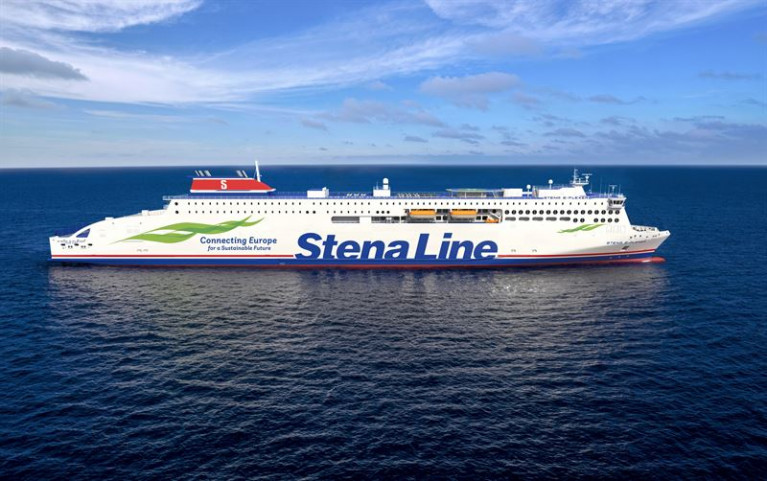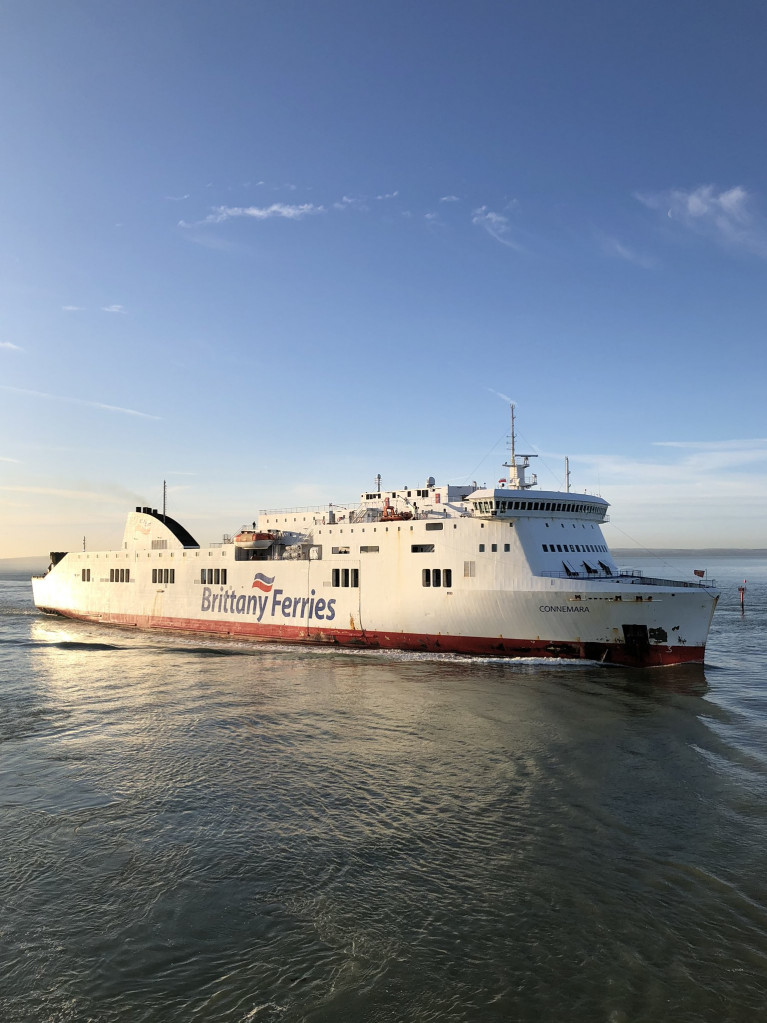Displaying items by tag: Increase Capacity
'E-Flexer' Class Ferries to Join Stena Line’s Baltic Sea Fleet Next Year
Stena Line which operates three of their 'E-Flexer' ro-pax class ferries on the Irish Sea, is to continue its expansion on the Baltic Sea during 2022, increasing both freight-and passenger capacity with larger versions of the new class.
The Swedish family-owned ferry company today announced that they will deploy their two new 240-meter-long fuel-efficient E-Flexer* ferries, on the Nynäshamn (Sweden)-Ventspils (Latvia) next year.
Stena Line also announced plans to increase the capacity on the Karlskrona (Sweden)-Gdynia (Poland) route with the deployment of the two large and modern ferries Stena Scandica and Stena Baltica. This pair, Afloat adds were formerly operating on the Irish Sea on their Belfast-Birkenhead (Liverpool) route until replaced by two E-Flexers and following introduction of class leadship Stena Estrid on the Dublin-Holyhead route in 2020.
Over the past year, Stena Line has expanded in the Baltic Sea, increasing both freight and passenger capacity, to cater for increasing demand of sea transportation in the region. This year Stena Line have already introduced new large and modern ferries on both of their two Latvian routes Nynäshamn-Ventspils and Travemünde (Germany)-Liepaja (Latvia).
Today, the ferry company announced that their expansion on the Baltic Sea will continue during 2022. Next year Stena Line will deploy their two new 240-meter-long fuel-efficient E-Flexer* ferries on the Nynäshamn -Ventspils route. The ferries will have a capacity for 1,200 passengers, an increase of 33% compared to existing ferries, and a total of 3,600 meters of freight lane meters, an increase of 25%.
“We continue growing together with our customers by strengthen our position and fleet across the Baltic Sea. Demand for capacity in the region keeps increasing as freight customers continue to expand and travel passengers choose ferry travel as their preferred safe form of transport in the wake of the pandemic. These large, modern, and fuel-efficient next generation ferries are the flag ships in the modernisation of our fleet as well as our development of sustainable shipping” says Niclas Mårtensson, CEO Stena Line Group.
Up to 30 % more energy efficient
Stena Line’s position as the leader in sustainable shipping is clearly visible and the new vessels are among the most energy efficient RoPax ferries in the world. The E-Flexer ferries are up to 30 % more energy efficient than existing vessels, thanks to optimum design of the hulls, propellers, bulbs, and rudders.
The vessels are delivered gas-ready, to allow conversion to methanol or liquid natural gas fuel. The new ferries will be equipped to use shore power during port calls to reduce emissions and the electricity connection also enables a conversion to battery hybrid in the future. The vessel will offer efficient loading and unloading with drive-through lanes on the two levels.
“Stena Line’s Scandinavian heritage is clearly visible on the interior and the design is spacious and light, with amazing panoramic views. The new vessels will offer our passengers a brand new onboard and travel experience on Ventspils-Nynäshamn, the shortest route between the Baltics and Scandinavia”, says Johan Edelman”, Trade Director Baltic Sea North, Stena Line.
Capacity increase on Karlskrona (Sweden)-Gdynia (Poland).
Stena Line today also announce their plans to increase the capacity on the Karlskrona-Gdynia route further during 2022 with the deployment of the two large and modern 222-meter RoPax ferries Stena Scandica and Stena Baltica. The two Visentini vessels has recently been lengthened and modernised and will add 30 % freight capacity and a brand new modern onboard experience for both drivers and passengers on the Karlskrona-Gdynia route.
*Ferry facts: E-Flexer ferries
The two 240-meter E-Flexer (MkII) ferries are designed in collaboration with Stena RoRo and is currently being built at the CMI Jinling Shipyard in Weihai, China, with expected delivery during 2022.
Stena Line has previously introduced the three 214-meter E-Flexer ferries Stena Estrid, Stena Edda and Stena Embla on the Irish Sea during 2019-2020. The E-Flexer ferries are among the most energy efficient RoPax ferries in the world, up 30 % more energy efficient than existing vessels, thanks to optimum design of the hulls, propellers, bulbs, and rudders.
Route: Nynäshamn (Sweden) – Ventspils (Latvia)
Names: not yet revealed by Stena Line
Length: 239,7 m
Breadth: 27,8 m
Lane meters: 3,600
Passengers: 1200
Cabins: 263
Port of Cork Set for Increased Ferry Frequency to France (Plus in 2021 New Route from Rosslare)
Ferry operator Brittany Ferries, writes EchoLive, has announced plans to increase services out of both Cork and Rosslare in 2021, despite ongoing uncertainty amid Covid-19.
The Port of Cork will see as Afloat on Saturday reported a new midweek sailing from Cork to Roscoff in addition to the weekend service already in place.
The Armorique vessel will be used for the sailings, which is new to Ireland (albeit see relief duties last year)
The Pont-Aven, one of the company’s (which is the flagship) ferries, will continue to serve the main Cork to Roscoff (seasonal) sailings at the weekend.
This route serves primarily tourists, with an approximate 50-50 split between French and Irish holidaymakers.
The company said: “It will open more choice for those seeking a shorter break in either Ireland or France, with options to leave and return with Brittany Ferries, either mid-week or at the weekend.”
For more plus announcement of a new Rosslare-Cherbourg route also in 2021, click here.
AFLOAT adds Brittany Ferries is to reintroduce ropax Connemara (following this year's closure of Cork-Santander service) back to Irish waters but running out of Rosslare. Afloat however also consulted the operator's website and noted that another 'Visentini' built ropax Etretat (ex. Norman Voyager of former Celtic Link Ferries) is scheduled to operate the 'économie' branded route from November. (It should be noted the schedule was updated today).
Connemara originally launched the Cork-Spain route in 2018 before replaced by yet another Visentini built ropax the Kerry.
Currently, Kerry operates the relocated Ireland-Spain service of Rosslare-Bilbao. In addition to serving Brittany Ferries other second new route out of the Wexford ferryport, the seasonal service to Roscoff which was due to open in March but was delayed due to the initial impact of Covid-19 and related travel restrictions.
Afloat also consulted the Rosslare-Roscoff sailings scheduled for this season up to October (but not listed for 2021). So could it appear the overcapacity by Brittany Ferries themselves be at the expense? of yesterday's official announcement of their newest route of Rosslare-Cherbourg (also seasonal).
As passenger reservations currently available for services up to the end of October (2021) aply to the following routes: Rosslare – Bilbao, Cork – Roscoff and the aformentioned Rosslare – Cherbourg route but excludes any reference to the Wexford-Brittany link.

























































